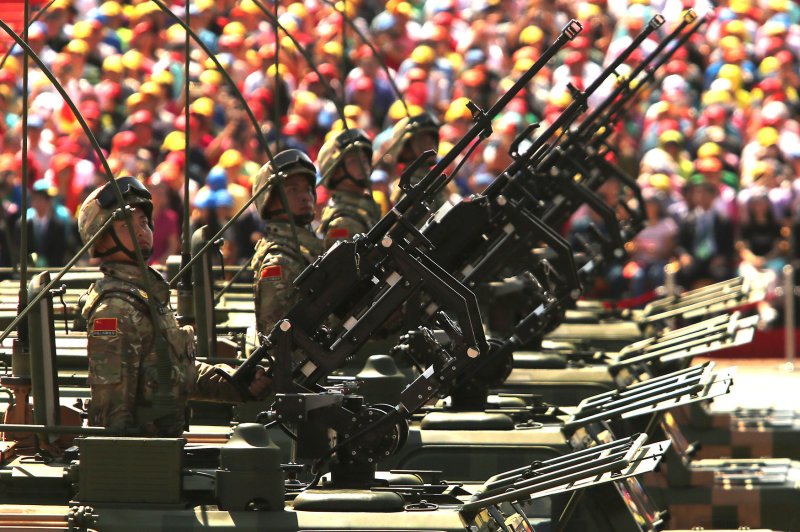1 of 12 | Over 12,000 soldiers and hundreds of tanks, ballistic missile launchers, amphibious assault vehicles, drones, fighter jets, helicopters and other military equipment participate in a massive parade marking the 70th anniversary of victory over Japan and the end of World War II in Beijing on Thursday. Presiding over the extravaganza, President Xi Jinping, China's most powerful leader in decades, said that China would remain committed to "the path of peaceful development" and unexpectedly vowed to cut 300,000 troops from its 2.3-million strong military - the world's largest. Photo by Stephen Shaver/UPI |
License Photo
BEIJING, Sept. 3 (UPI) -- China's grand parade on Thursday, held to mark Japan's defeat in World War II, stirred nationalist sentiments as 12,000 troops marched near Tiananmen Square alongside the latest weapons and aircraft on display.
The event was marked by a speech from Chinese President Xi Jinping, who said he would downsize the nation's 2.3 million-member armed forces by 300,000, The New York Times reported.
Military officials defended the decision, and Senior Col. Zhou Bou, director of the International Security Cooperation at the Ministry of National Defense, said the reductions would mean improvements to China's People's Liberation Army.
"To have it reduced means that the quality of the P.L.A. has actually increased," Zhou told the Times.
The Chinese colonel said the military would continue to diversify in a move that "will spill over from Chinese territory" to maintain peacekeeping and humanitarian missions in other parts of the world, including Africa.
China displayed more than 500 items of weaponry, including missiles, and 200 aircraft were on exhibit. Military helicopters formed the number 70 to mark the 70th anniversary of the war's end.
During his speech on Thursday, Xi said the event commemorates a "decisive battle between justice and evil...In that devastating war, the Chinese People's War of Resistance Against Japanese Aggression started the earliest and lasted the longest."
The BBC reported China has claimed that it is the "forgotten ally" who brought defeat to the Axis powers in World War II, and that its role in Japan's defeat has been underplayed in the post-war narrative.
The parade drew favorable responses from the Chinese public, including students at Tsinghua University in northwest Beijing, who watched the display of military power on television.
"The parade is politically necessary," Bai Nan, a 23-year-old engineering student, told the Times. "It will tell the people that China is now a strong country. And it will also somehow makes the people respect the government."
The Chinese student said, however, he was not anti-Japanese.
Chinese officials have said the event is not anti-Tokyo, but many leaders of the West, and Japanese Prime Minister Shinzo Abe declined to participate.
Xi said Thursday the "unyielding Chinese people fought gallantly...against the Japanese militarist aggressors."
"This remarkable feat of the Chinese nation was rare in the history of war."
Xi also said that China would never seek hegemony or expansion.
"We Chinese love peace," he said.















